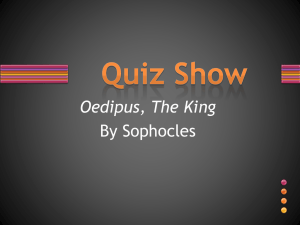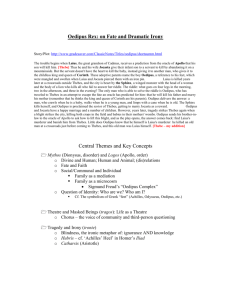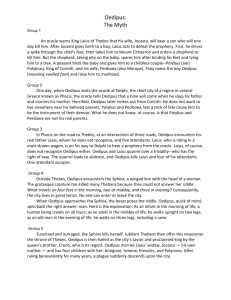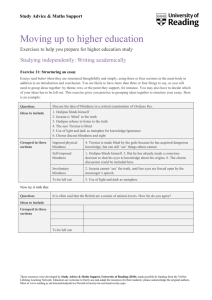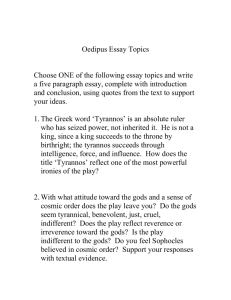Logical Fallacies in Oedipus.doc
advertisement
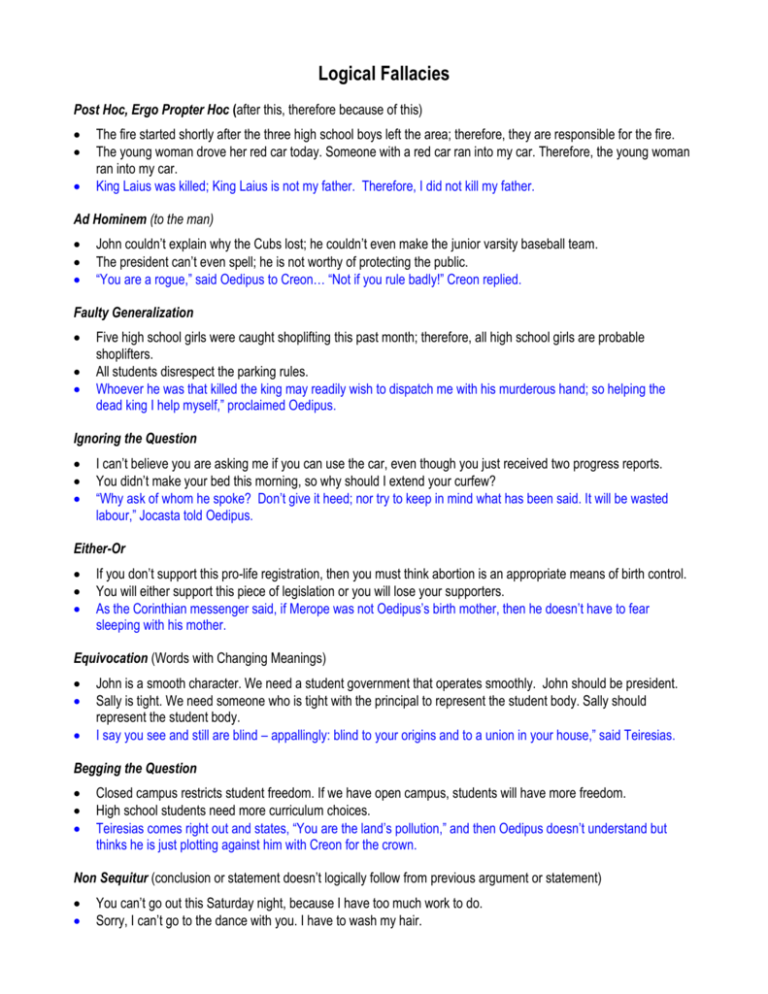
Logical Fallacies Post Hoc, Ergo Propter Hoc (after this, therefore because of this) The fire started shortly after the three high school boys left the area; therefore, they are responsible for the fire. The young woman drove her red car today. Someone with a red car ran into my car. Therefore, the young woman ran into my car. King Laius was killed; King Laius is not my father. Therefore, I did not kill my father. Ad Hominem (to the man) John couldn’t explain why the Cubs lost; he couldn’t even make the junior varsity baseball team. The president can’t even spell; he is not worthy of protecting the public. “You are a rogue,” said Oedipus to Creon… “Not if you rule badly!” Creon replied. Faulty Generalization Five high school girls were caught shoplifting this past month; therefore, all high school girls are probable shoplifters. All students disrespect the parking rules. Whoever he was that killed the king may readily wish to dispatch me with his murderous hand; so helping the dead king I help myself,” proclaimed Oedipus. Ignoring the Question I can’t believe you are asking me if you can use the car, even though you just received two progress reports. You didn’t make your bed this morning, so why should I extend your curfew? “Why ask of whom he spoke? Don’t give it heed; nor try to keep in mind what has been said. It will be wasted labour,” Jocasta told Oedipus. Either-Or If you don’t support this pro-life registration, then you must think abortion is an appropriate means of birth control. You will either support this piece of legislation or you will lose your supporters. As the Corinthian messenger said, if Merope was not Oedipus’s birth mother, then he doesn’t have to fear sleeping with his mother. Equivocation (Words with Changing Meanings) John is a smooth character. We need a student government that operates smoothly. John should be president. Sally is tight. We need someone who is tight with the principal to represent the student body. Sally should represent the student body. I say you see and still are blind – appallingly: blind to your origins and to a union in your house,” said Teiresias. Begging the Question Closed campus restricts student freedom. If we have open campus, students will have more freedom. High school students need more curriculum choices. Teiresias comes right out and states, “You are the land’s pollution,” and then Oedipus doesn’t understand but thinks he is just plotting against him with Creon for the crown. Non Sequitur (conclusion or statement doesn’t logically follow from previous argument or statement) You can’t go out this Saturday night, because I have too much work to do. Sorry, I can’t go to the dance with you. I have to wash my hair. Oedipus suddenly accuses Creon of murdering Laius when Teiresias accuses Oedipus of being the murderer Action of Oedipus the King 1. Thebes is plagued. 2. Priest asks Oedipus to DO something about it. 3. Oedipus says, “I have done something; I sent Creon to Delphi to find out what Apollo wants us to do.” 4. Creon reports from Delphi: We must get rid of Thebes’s “pollution” and find Laius’s murderer. 5. Oedipus says, “Of course! Let’s solve the murder! Otherwise, the murderer may even come after me!” (He does not realize he himself is the killer of Laius.) 6. Oedipus calls in Teiresias (the blind prophet), and Oedipus doesn’t like what Teiresias has to say (“You are the pollution, the murderer.”). 7. Oedipus blames Creon for influencing Teiresias and plotting against/trying to blame Oedipus for Laius’s murder. 8. Jocasta says, “Don’t listen to prophets! They’re never right,” and then proceeds to tell Oedipus how they were wrong when they told Liaus he’d be killed by his son. She tells Oedipus that she and Laius had disposed of their son (pierced his feet and left him on the mountain). Laius, she says, was killed by a foreigner at a crossroads - where three roads meet (Davlia/Daulia). 9. Oedipus realizes he may have killed Laius. Plus, he’s ashamed that he is sleeping with the wife of a man he may have killed. (He does not yet realize she is also his mother! 10. A messenger arrives with both good news and bad, saying “Good news! The people of Corinth want you to be their new king because – sorry - King Polybus, king of Corinth, has died.” 11. Oedipus is relieved that Polybus (the man he thinks is his father because he raised him) is dead because he believes the first part of the prophecy (that he will kill his father) cannot now come true. He does not want to return to Corinth, however, because Merope (the woman he thinks is his mother because she raised him) is still alive, and he is afraid of possibly sleeping with his mother. 12. Messenger says, “Don’t worry! She isn’t really your mother! You were adopted!” 13. Messenger tells how a shepherd had given Oedipus to him as a small baby. The messenger then gave Oedipus to Merope and Polybus (queen and king of Corinth) to raise. 14. Jocasta realizes what has happened and begs Oedipus to stop trying to figure out who he is. 15. Oedipus, intent on discovering the truth, calls for the shepherd to ask where he (Oedipus) came from. 16. The shepherd says the baby came from “the house of Laius.” 17. Oedipus thinks he might be the son of a slave and not of royal blood. 18. The shepherd admits that Jocasta gave him the baby (Oedipus). 19. Jocasta commits suicide, unable to face the “pollution” between herself, her husband, her son, and their children. 20. Oedipus blinds himself, unable to look upon that same “pollution.”


